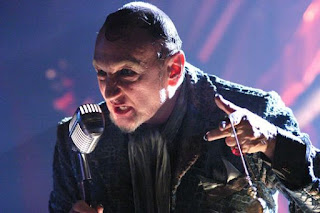Returning to this show, there were
three epiosdes of Masters of Horror
that immediately came to mind before I even starterd watching:
Homecoming, The
Washingtonians, and Dance
of the Dead. Dance
stands out for a reason: It's a story about the hororr of giving up
on humanity. A post-apocalyptic world where people still go through
the motions of keeping the lights on, but beneath it all there's
little human decency left.
The story takes
place after World War III and a series of terrorist attacks have
introduced a new chemical weapon: Blizz. It's a substance that can
be mixed with clouds to produce a rain of ashes that burn any living
thing they touch. Millions have died, and the rule of law is implied
to still technically exist, but be very loosely enforced. Money and
property rights still exist, there's even a reference to “paying
rent,” but property seems to be just about the only right accepted.
The main character
is Peggy (Jessica Lowndes), a naïve young woman who lives and works
at a diner owned by her mother, Kate (Marilyn Norry), who sees Peggy
as her last hope of normality now that her sister and father have
both passed away. They live in a world where owning a diner is the
equivalent of winning the lottery. To make them even luckier, it's
implied the diner doesn't even turn a profit, but Kate insists
Peggy's father left them some money.
Trying to get a
better understanding of the world, Kate runs off with a young man
named Jak (Jonathan Tucker) to the town of Muskeet, a place primarily
inhabited by bikers, gangs, and drug addicts. There, a club called
the Doom Room, run by “the MC” (Robert Englund), puts on shows
displaying “the Dance of the Dead,” performed by LUEs (Lifeless
Undead Phenomenon), the corpses of young men and women who overdosed
on a stimulant developed to keep soldiers fighting during the War.
Their bodies continue to spasm long after their death, so they use
electric prods to make dead bodies “dance.”
Peggy recognizes
her sister Anna (Melena Ronnis) as one of the animated corpses, and
she and Jak try to tak her body. The MC chases them down, and
there's an encounter with Kate who followed them to Muskeet. The MC
reveals that Kate sold him Anna when she overdosed, because Kate was
tired of dragging her home every week. This sale, not a deceased
father, is the source of all of Kate's money. Peggy agrees to trade
the wounded Kate for Anna's body, and gives it a proper burial with
Jak, joining him as a resident of Muskeet.
This
episode says a lot by way of implication. It's probably a better
depiction of human nature than almost any other I've ever seen. The
apocalypse did not create a Mad Max
scenario, because that would be a situation from which no one
benefits. Rather, the apocalypse brings a world in which the weak
and the old have little recourse for their grievances, as society
pushes on just enough to maintain itself. Maintaining a civilization
is, ironically, the most primal of human instincts, and we really
don't care who gets bulldozed in the construction of that civilation.
We see that Blizz survivors are persona non grata, and that the old
are used as a source of plasma to keep LUPs functional. Everyone
knows that they'll eventually be destroyed by the society they live
in, but it's not like an individual's choice to change is going to
fix anything, so why bother?
Of
course Englund is always amazing. Here he gives us a far more
morally dubious character than Freddy. He's honest, but completely
and unapologetically out for himself. He comes across as a character
above good and evil, despite being completely human. He's
effectively the Devil come to collect his due from those who have
sinned...which is literally every character in this world. At one
point one of Jak's friends says that the Dance is “what happens to
people like me.” These people are in hell, with a stay on their
punishment for as long as they're strong, young and attractive, or at
least rich enough to feed themselves. They either accept or denying
that nothing good can come from a world devoid of compassion.
The final scene,
Peggy as a Muskeet girl while her mother dances, is probably one of
the most touching and disturbing in the the entire series. It's an
acceptance of a sad reality. She knows she's doomed, and chooses to
live that life. But we still see the conflict in her eyes as she
waits for her punishment to come in a world where she knows she can
expect nothing different. There is no good choice, no action that
does not harm others, and no chance of salvation. The world
continues on, as civilization crushes souls.

No comments:
Post a Comment